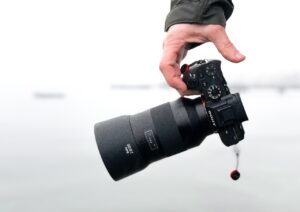
Deciding whether a mirrorless camera is right for you depends on your specific needs, preferences, and intended use cases. Here are some factors to consider when making this decision:
Size and Portability: Mirrorless cameras are generally smaller and lighter than traditional DSLR cameras since they lack the mirror mechanism. If portability is important to you, a mirrorless camera might be a good choice, especially for travel and everyday shooting.
Image Quality: Mirrorless cameras can offer excellent image quality, often on par with DSLRs. They typically have large sensors and advanced technology for capturing high-resolution images and handling low-light situations.
Interchangeable Lenses: Mirrorless cameras usually support interchangeable lenses, allowing you to adapt to various photography styles. However, lens options might be more limited compared to established DSLR systems.
Autofocus and Speed: Many mirrorless cameras have advanced autofocus systems that can be particularly beneficial for fast-paced photography, such as sports or wildlife photography. They can also offer high continuous shooting speeds.
Video Capability: Mirrorless cameras are often preferred for videography due to their ability to provide high-quality video output, adjustable settings, and continuous autofocus during video recording.
Electronic Viewfinder (EVF): Some mirrorless cameras offer electronic viewfinders that provide a digital preview of your shot through the lens. This can help you compose shots more accurately and see how exposure settings affect the image in real-time.
Battery Life: Mirrorless cameras tend to have shorter battery life compared to DSLRs due to their electronic components and often-on LCD or EVF screens. Consider the need for spare batteries, especially for longer shoots.
Lens Compatibility: If you already have a collection of lenses from another camera system, check if there are suitable adapters available for the mirrorless camera you’re considering. Keep in mind that some functionalities might be limited when using adapters.
Budget: Mirrorless cameras can vary widely in price, from entry-level models to high-end professional options. Consider your budget and what features are most important to you.
Learning Curve: If you’re transitioning from a point-and-shoot or smartphone photography, there might be a learning curve in understanding the more advanced settings and controls of a mirrorless camera.
Brand and Ecosystem: Research the available camera brands and their associated lens and accessory ecosystems. Consider factors like the availability of lenses, third-party accessories, and customer support.
Ultimately, the decision depends on your photography goals and preferences. If you prioritize portability, video capabilities, and the latest technology, a mirrorless camera could be a great fit. However, if you have specific requirements or preferences related to lens availability, battery life, or familiarity with a DSLR system, you might want to explore both mirrorless and DSLR options before making a decision.